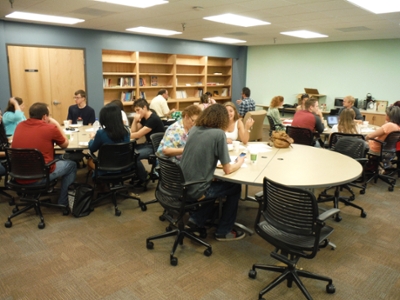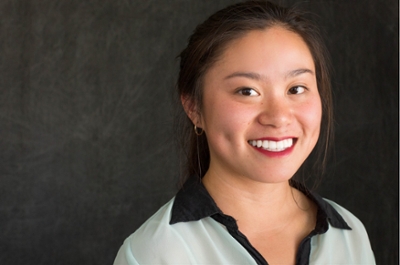Student Survivors
 Our goal is to focus on how students reach their STEM undergraduate aspirations.
Our goal is to focus on how students reach their STEM undergraduate aspirations.
Yay! Our first Student Survivors piece comes from our very own PLFs!
(Click HERE for more info on our re-occurring blog topics.)
Pre-Semester Training for our Peer Learning Facilitators (PLFs) takes place on the Friday before each new academic semester. A portion of this semester’s training was devoted to introducing the Student Survivors blog series to the PLFs. It is important for our PLFs to be involved in this blog series because, first and foremost, they are student survivors themselves. Although not all of the PLF’s are STEM majors, they are hired as subject experts in STEM courses as a result of their exceptional performance when they took the serviced course.
In small groups, the PLFs brainstormed obstacles they have faced in pursuing their degrees. These were the most common challenges faced by our student employees:
- Financial struggle
- Community building
- College preparedness
- Stress management
- Time management
- Imposter syndrome
It was important to discuss these subjects as a group for two reasons. First, in sharing with their peers, the PLFs realized that they had a great deal in common with one another. This is important because it builds a sense of community and belonging, a key aspect of success. Second, the PLFs will go forward into the semester with the understanding that the students in the courses they are serving are also struggling to survive university life. You never know what obstacle a student is trying to overcome and a little compassion and understanding can go a long way. This idea will inform the PLF’s interactions with students both in the classroom during office hours.
The Student Survivors blog series will be looking at these and other obstacles students face in more detail in the coming weeks. So, stay tuned!
For October we are showcasing UNM student Krista Houmpheng, the living embodiment of a Student Survivor. Like many undergraduates, Krista juggles several other commitments and obligations alongside her academic pursuits. She is an example of a STEM student that really does it all. Despite the challenges she faces (which reflect some of the most common challenges identified in our first Student Survivors piece), Krista stays the course and is on track graduate in 4 years with her Bachelor’s degree in Biochemistry, May 2016.
Read more about Krista’s journey below and pay special attention to her tips and tricks for success!
(Click HERE for more info on our re-occurring blog topics.)
 Q. Why did you choose your major?
Q. Why did you choose your major?
A. I chose biochemistry because the human body is SO fascinating. It’s all too easy to be fooled by this exterior that we call skin. Did you know we have 1001+ processes going on beneath our exterior at any given moment to ensure that we can walk, talk, breathe—basically, to live? Biochemistry has given me a greater appreciation for our bodies and the foundational knowledge of how the human body functions.
Q. How do you plan to use your degree?
A. Hopefully med school! Sometimes, I like to compare the human body to that of a machine; like all machines, sometimes they get “broken”. Why not use my scientific background in combination with medicine to help those who are sick?
Q. Do you participate in any extra-curricular activities or volunteer work?
A. Yes, I commit about 10 hours per week to Alpha Chi Omega women’s fraternity. I’ve also been the Vice President of Intellectual Development for 2 years, and am the Collegiate Recruitment Information Chair, responsible for the management and organization of sorority recruitment.
Since Fall 2014, I have dedicated about 8 hours per week to UNM Hospital’s UNMH Emergency Department (ED) as a Research Student and Teaching Assistant facilitate the generation to ideas while serving as a resource for any questions the younger students may have through a special topics course that allows me to develop my own research projects that could potentially become a real study in the UNMHED. Whenever I have a break from my research, I shadow the ED physicians!
Q. Do you have another job other than being a full-time STEM student?
A. I have two jobs—I work as a waitress at my family’s restaurant, and hold an internship at Sandia National Laboratories. Combined I work 30 hours a week.
Q. How are you able to balance such a demanding course load and still have time for work and activities?
A. Time management and organization are key—I use my agenda to have everything in a single location that I can reference when I need to, and I check it constantly to make sure I didn’t miss anything. I write down all of my activities, due dates, upcoming test dates, etc..
Q. What are the three biggest challenges you have faced in college thus far?
A. Time management, meeting new people/making friends, and self-doubt.
Q. How have you overcome these challenges?
A. Time management—I’m not going to lie, like most people, I still struggle with procrastination, but it’s slowly improving. Studies say that it takes at least three weeks of dedication to change a habit—I start my homework as early as I can to avoid the stress that accompanies pulling an all-nighter before an assignment is due. Also, I’m old—I can’t pull all-nighters anymore. I need my beauty sleep!
Meeting new people and making friends— College years are supposed to be the best years of your life, right? Sometimes, you have to go out there and make opportunities for yourself instead of waiting for opportunities to find you. I ended up doing something completely unexpected—I joined a sorority my sophomore year and found a group of women who welcomed me with open arms. TLDR: Do what you want to do! Life is too short to not take advantage of different experiences. Live by this Mark Twain quote: “Twenty years from now, you will be more disappointed by the things you didn’t do than by the ones you did do.”
Self-doubt— Being a STEM major is hard. As if your major alone wasn’t already difficult enough, you’re surrounded by brilliant people who seem to constantly get good grades while you’re struggling. But, I realize now that this feeling is normal, just keep moving forward! It’s referred to as the Impostor Syndrome. It’s all about perspective; instead of thinking, “Gosh, I’m a failure, I’ll never be good enough”, I focus on changing it up and think, “Okay, I didn’t do so great, but I can do better next time. What can I learn from this?” I use my competitive nature as motivation—being around strong people makes me push myself in the pursuit of becoming better.
Q. What would you say your biggest accomplishment has been academically? Personally?
A. Academically, it’s been my ability to maintain a high GPA while juggling 30 hours of work, in addition to 15-20 hours of extracurricular activities.
Personally, my biggest accomplishment would be branching out and meeting new people. In high school, I used to be extremely shy. I hated initiating conversations, I wasn’t involved in any sports or clubs, and I considered myself to be an introvert. However, I wanted to change that in college—joining a sorority forced me to break out of my shell. I made new friends, got involved, taking on leadership positions. I used to be terrified of public speaking—now I can address a room of 80+ women, no problem. Having this support system gave me the confidence to go out in other areas of my life to meet new people and find new opportunities.
Q. What advice would you give to a freshman pursuing a STEM degree that would help them make it to the finish line?
A. You can do it! Most of the time, students are too focused on the end product (i.e. graduation, grad school, potential job, etc.) that they don’t realize it’s a journey. Being a STEM major is a marathon, not a sprint. Have confidence in yourself and stop comparing yourself to other people. It’s all too easy to look around and think, “I’m not good enough.” Change that thinking! You have to believe in yourself and your abilities before anyone else will.☺
A. Shelby Snow, Electrical Engineering and Applied Math
Q. Where did you graduate from high school?
A. I graduated from Belen High School in 2010.
Q. When you first started college, did you imagine your academic career would take shape like it has?
A. No, not at all. I originally started college at Adam State University in Alamosa, CO under the Western Undergraduate Exchange (WUE) Program. I was an engineering major but I intended to transfer to CU Boulder once I obtained in-state tuition so I could pursue a degree in Aeronautical Engineering. I ultimately transferred to the University of New Mexico (UNM) in my sophomore year and began studying Electrical Engineering.
Q. What challenges have you faced coming to UNM from a rural high school?
A. In high school, I was in an accelerated math program with three other students. We took our math courses at Belen High School but we earned college credit through UNM Valencia. Having four people in your high school math classes is much different than 50+ students in UNM mathematics courses. I was with the same math teacher in high school for all four years. He was able to give all of his students individual attention and track our progress. That is really not possible with the large class sizes at UNM.
I often meet people who are shocked that I'm an engineering major when I tell them I'm from Belen. I'm not sure why there seems to be some preconceived notion that if you are from a small town, you are somehow capable of less or will have less opportunity to major in STEM. I know there are challenges in coming from a small community, but if you have the drive you can succeed.
Q. How have you overcome these challenges?
A. I kept in contact with my high school math teacher. He has been super helpful and has been a great mentor. Once when I considered switching out of engineering, my former teacher encouraged me to stick it out and told me I would have more options later in life if I continued.
Q. What challenges have you faced as a female studying engineering?
A. The ratio of males to females studying engineering is really uneven. I have yet to have a female instructor in my engineering course work. I have had one female instructor, but that was in a mathematics course. I hope to have a family some time in the far distant future. It would be nice to have more female role instructors in engineering in general but also mothers to see that it is actually possible to have some kind of home-life balance in this field.
Even in my large engineering lectures, there are sometimes less than five other female students in the course with me. It has been discouraging at times to not have many females to relate to, study with, and ask for advice on some of this stuff.
Q. How have you overcome these challenges?
A. I was briefly involved in Society of Women Engineers (SWE) but mostly I got heavily involved in social student organizations on campus. This gave me a way to meet other women and have a support system.
Q. What advice would you give other undergraduate STEM students struggling with some of the same challenges as you?
A. My best advice is to keep going. At times it seems easier to switch your major, especially if all of your friends are non-STEM majors and friends in your major are all males, but the easiest path is not always the right one. I try to tell myself that continuing in Electrical Engineering will ensure that I have a stable future and an interesting career path. My #1 goal is to work in ride systems and controls in Imagineering with the Walt Disney Company. I think about this when my course work gets hard. I would advise other STEM students to keep their eyes on the prize too!
This addition of Student Survivors features a student member of the Freshman STEM Project (FSP). The FSP is a joint project between the STEM Up and STEM Gateway grants that seeks to help STEM-interested freshman succeed in their first year of college through advising, professional mentorship, success coaching and more! Bryan is one of many great STEM students involved in the project. Read more about his story below!
Click here for more information about the Freshman STEM Project.
Q. What is your name and current major?
A. My name is Brian Villalva and I’m currently pursuing a Bachelor’s of Science in Chemistry with a minor in Business.
Q. Where did you graduate from high school?
A. I graduated from Sandia High School here in Albuquerque.
Q. Have you found any benefits in college from graduating from a local high school?
A. Well, being able to still live at home in college will allow me to save money for a few more years. I also had a lot of great AP science teachers that I keep in touch with. My AP Chemistry teacher is who actually inspired me to pursue Chemistry in college.
Q. What were your expectations coming into college?
A. Right after I graduated from high school, it really hit me that I was going to be attending college is the fall. I was so nervous and had no idea what to expect even though everyone around me kept saying, “It will be fun!” My siblings didn’t pursue four-year degrees at a traditional university so there was really no one in my family that could give me advice. I felt really uncomfortable about the idea of starting college until New Student Orientation (NSO). At NSO, I learned about the different programs I could be a part of and signed up for email lists.
Q. What have you found most surprising in college so far?
A. Something I noticed right away is how difficult it is to make friends. In high school, you’re with the same people every day and in college, not all students show up to class every day and you also may never have another class with someone after the semester is over. In college, you spend a lot more time alone.
Also, pluses and minuses on your grade matter now! They didn’t in high school.
Q. What specific challenges have you faced in college?
A. I really haven’t face too many challenges in college, honestly. This is because of the Freshman STEM Project. Kevin Smith has really helped me in our biweekly meetings.
Being involved in the Freshman STEM Project has helped me set up a support system that holds me accountable. Once you leave high school, no one is holding your hand. It has been nice to have someone check-in on me to make sure I’m doing well in college.
Q. What advice would you give other students?
A. Do the extra work when you can, even if you don’t feel like it. It will make a difference in the end. Also, use CAPS and book study rooms to use. I also try to do all my homework and studying on campus. I don’t do any of that when I’m home.
I would also tell other students to get involved on campus as much as they can! A great way to get plugged-in is through student organizations and the student government. You will get to know a diverse network of people outside of STEM. I’m going to try to be even more involved this semester!
Q. What are some of your goals and plans for the future?
A. I hope to get an internship with Sandia National Laboratories. I also plan to pursue a master’s degree one day and hopefully conduct my own research.
Tips for Non-Traditional Students by Nicolai Loner
Coming back to school after a period of longer than 5 years can be stressful. The longer you are away, the worse it gets. Your brain doesn’t quite work at the capacity of the younger students, you are not able to stay up at night, and the list goes on. You may feel like there is no one else in your shoes, no one else that has kids, no one else that has real adult responsibilities. Thankfully, you are in good company.
As they grow older, many people find that they are unhappy with the status quo. Some people have reached a glass ceiling at work. Some people never went to college in the first place. Others just desire a change of scenery. Whatever the case may be, life has brought you to a place where you are able to return. Some of the feelings that you may encounter are stress, anxiety, depression and more stress. Not only do you have to deal with the pressures of school, but you are also no longer under your parent’s roof. You have real responsibilities now.
You have to worry about doing well in your classes in addition to taking care of the life you have built. It is tough out there for the non-traditional student. When you finally manage to register, pay your tuition, buy your books, you have to actually have to go to class! The first thing you notice is that your peers are so …YOUNG. You start to search around for a face that bears a gray hair. You search for someone that mentions their kids or spouse. You lean into conversations hoping to hear someone say their age so that you can match it up to yours. That’s when the depression may set in. Part of being a human adult is making social connections. When you are in a room without any common interests, it just adds to the anxiety that comes with taking courses. There is HOPE! In my experience, I have met many people along the road that have made this transition pleasant. There are a multitude of student organizations that are catered to the non-traditional student.
Another bonus in being an older student is that you can relate more to your professors. They will actually take you
seriously! The thing that sets you apart from your peers, is that you have made a conscientious decision to return to school. YOU chose this and you are determined to make your mark. Don’t for a minute think the professor hasn’t noticed this. You are who they look towards to set the bar for the class. You are the person they recommend to students who struggle. You will be more successful because you WANT to be there.
Don’t be afraid of the choice you have made. You will be the better for it. Remember that if you are ever sad or stressed about your decision, there are others there to help. We exist in every discipline and every department. We range in age from 25 to 80 so don’t ever feel alone. You will ROCK this degree!
About the Author
Nicolai Loner is a self-proclaimed non-traditional student pursuing a Bachelor of Science in Chemical Engineering at the University of New Mexico. Nicolai works three awesome jobs on campus. He serves as a Peer Learning Facilitator in Dr. Habel-Rodriguez’s Chemistry 122 course. Nicolai also leads a section of MatLab under Steve Peralta and works as a TA for CBE 101 with Dr. Abhaya. Nicolai has a lot on his plate but manages to succeed at all he endeavors. For this and many other reasons, STEM Gateway is proud to showcase Nicolai in this month’s addition of Student Survivors.
Student Survivors: Meilinn Tram
April’s edition of Student Survivors is brought to you by Meilinn Tram. Meilinn is a Peer Learning Facilitator (PLF) with STEM Gateway and she has tons of great advice for undergraduates. In this piece, Meilinn discusses a very important component of student survival: NUTRITION! Be sure to read this through and make sure you’re giving your body the fuel it needs for finals week.
Eating Right Puts You Ahead
Everyone is guilty of getting a quick bite to eat every once in a while. I know I’m guilty of being too lazy to cook and getting something off the dollar menu on my stressful days. I mean, it is only a dollar… right?? But once everything slows down, I think dang—how many calories did I just eat? After checking the nutrition facts, I think HOW MUCH FAT DID I JUST CONSUME?! Let me share with you some small facts about the nutrition menu from my personal favorite: Wendy’s
These are heart breaking facts, I know. But a good ratio of carbs, protein and fat should be:
Honestly, there is some give and take dependent on what kind of person you are and what kind of body you want, you could be a professional body builder for all I know! If you are reading on this blog, I’m going to assume you’re an awesome student who is trying to improve their diet and trying to stay ahead of the curve. DON’T LET THE FRESHMAN 15 GET YOU!
I don’t know about you, but when I think of a good student, I envision someone who is constantly studying. I actually have friends who are constantly studying, which I think is extremely unhealthy. You just need to TAKE A BREAK. A machine that is constantly running will eventually breakdown. This is why factories close in the evening. They even sometimes close over the holidays. Your brain needs a break once in a while. Take a break and eat your lunch; you should actually take a mental break.
There is a lot of temptation when it comes to fast food. It has two things going for it: it is fast and it is food. But there are ways to cook our meals that make it fast and easy. You can meal prep so you can have breakfast, lunch, and dinner prepare for the week, or at least the next couple of days. Here are a couple of recipes that are fast and easy to make for the whole week. Another option is to invest in a slow cooker too! If you’re looking for some recipes to help you get through finals week, try a hearty oatmeal bowl or lentil soup. Now, get out there and cook!
About the Author

Meilinn Tram graduated in December 2015 with a B.S. in biochemistry and immediately started work on her M.B.A. with a concentration in operational management and marketing. Meilinn was a Ronald E. McNair scholar. This scholarship funded her research regarding conversion of a spray dry vaccine into a more viable powder. She also received a National Institute of Health Fellowship which funded her travel to Johns Hopkins Medical School to research polycystic ovarian syndrome.
Meilinn hopes to start medical school in 2017 and plans to apply to a MD/Ph.D dual degree program earning a Ph.D in genomics and medical degree simultaneously. She would like to become a pediatrician and attempt to overcome genetic diseases. She aspires to open her own clinic or business or run her own lab someday.


